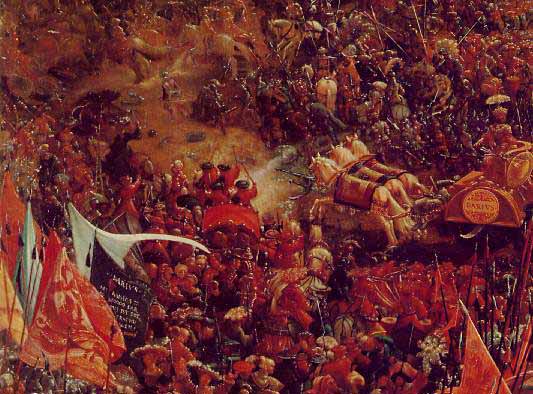Flavius Josephus
(37-100)"But why dwell on the commonplace rubbish which the starving were driven to feed upon, giver that what I have to recount is an act unparalleled in the history of either the Greeks or the barbarians, and as horrible to relate as it is incredible to hear?"

The Siege of Jerusalem, AD 70
Jerusalem fell, after a siege, to a Roman army under Titus.
by Josephus
Josephus was a Jew who had gone over to the Romans.
Throughout the city people were dying of hunger in large numbers, and enduring unspeakable sufferings. In every house the merest hint of food sparked violence, and close relatives fell to blows, snatching from one another the pitiful supports of life. No respect was paid even to the dying; the ruffians [anti-Roman zealots] searched them, in case they were concealing food somewhere in their clothes, or just pretending to be near death. Gaping with hunger, like mad dogs, lawless gangs went staggering and reeling through the streets, battering upon the doors like drunkards, and so bewildered that they broke into the same house two or three times in an hour. Need drove the starving to gnaw at anything. Refuse which even animals would reject was collected and turned into food. In the end they were eating belts and shoes, and the leather stripped off their shields. Tufts of withered grass were devoured, and sold in little bundles for four drachmas.
But why dwell on the commonplace rubbish which the starving were driven to feed upon, giver that what I have to recount is an act unparalleled in the history of either the Greeks or the barbarians, and as horrible to relate as it is incredible to hear? For my part I should gladly have omitted this tragedy, lest I should be suspected of monstrous fabrication. But there were many witnesses of it among my contemporaries; and besides, I should do poor service to my country if I were to suppress the agonies she went through.
Among the residents of the region beyond Jordan was a woman called Mary, daughter of Eleazar, of the village of Bethezuba (the name means "House of Hyssop"). She was well off, and of good family, and had fled to Jerusalem with her relatives, where she became involved with the siege. Most of the property she had packed up and brought with her from Peraea had been plundered by the tyrants [Simon and John, leaders of the Jewish war-effort], and the rest of her treasure, together with such foods as she had been able to procure, was being carried by their henchmen in their daily raids. In her bitter resentment the poor woman cursed and abused these extortioners, and this incensed them against her. However, no one put her to death either from exasperation or pity. She grew weary of trying to find food for her kinsfolk. In any case, it was by now impossible to get any, wherever you tried. Famine gnawed at her vitals, and the fire of rage was ever fiercer than famine. So, driven by fury and want, she committed a crime against nature. Seizing her child, an infant at the breast, she cried, "My poor baby, why should I keep you alive in this world of war and famine? Even if we live till the Romans come, they will make slaves of us; and anyway, hunger will get us before slavery does; and the rebels are crueler than both. Come, be food for me, and an avenging fury to the rebels, and a tale of cold horror to the world to complete the monstrous agony of the Jews." With these words she killed her son, roasted the body, swallowed half of it, and stored the rest in a safe place. But the rebels were on her at once, smelling roasted meat, and threatening to kill her instantly if she did not produce it. She assured them she had saved them a share, and revealed the remains of her child. Seized with horror and stupefaction, they stood paralyzed at the sight. But she said, "This is my own child, and my own handiwork. Eat, for I have eaten already. Do not show yourselves weaker than a woman, or more pitiful than a mother. But if you have pious scruples, and shrink away from human sacrifice, then what I have eaten can count as your share, and I will eat what is left as well." At that they slunk away, trembling, not daring to eat, although they were reluctant to yield even this food to the mother. The whole city soon rang with the abomination. When people heard of it, they shuddered, as though they had done it themselves.
![]()
